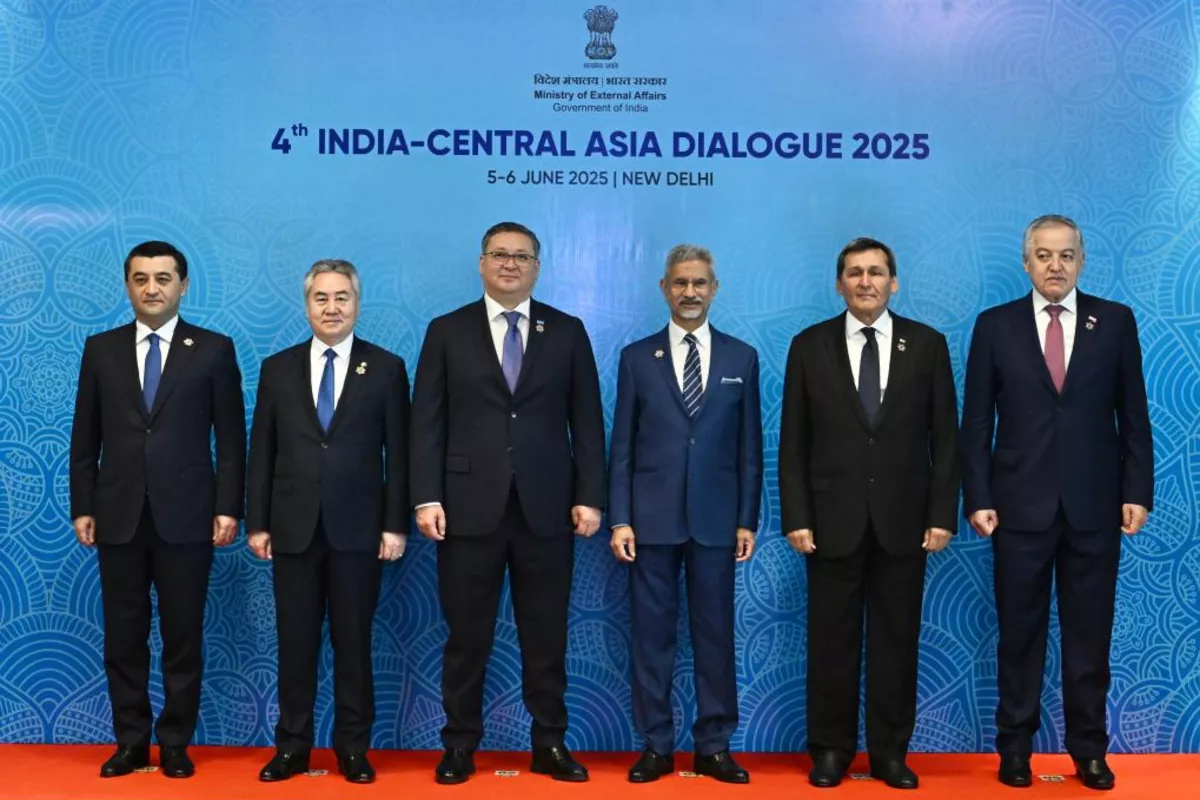
Foreign ministers from Central Asia and India gathered in New Delhi on June 6 for the fourth Central Asia-India Dialogue. Photo credit: Kazakh Ministry of Foreign Affairs
On June 6, foreign ministers from Central Asia and India met in New Delhi for the fourth Central Asia-India Dialogue, emphasizing regional connectivity, security, green energy, and technological collaboration as key areas for strengthening multilateral ties.
Kazakhstan’s Deputy Prime Minister and Foreign Minister Murat Nurtleu participated in the dialogue, emphasizing the need to strengthen transport infrastructure, counter transnational threats, and foster digital innovation to promote long-term regional stability, The Caspian Post reports citing The Astana Times.
On the sidelines, he also met with top executives from major Indian corporations to advance bilateral investment partnerships.
Central Asia-India dialogue: a connected and secure region
The ministerial meeting addressed key areas of cooperation, including transportation and logistics networks, regional security, digital development, and climate resilience.
Nurtleu highlighted Kazakhstan’s commitment to advancing the Trans-Caspian International Transport Route (TITR), a strategic corridor linking Asia and Europe, and invited Indian companies to invest in infrastructure projects to expand its capacity.
“Central Asia is becoming an important logistics hub capable of connecting Asia and Europe through Kazakhstan,” he said.
Kazakhstan also proposed expanding collaboration in green energy, fintech, and the IT sector, advocating for greater trade diversification and improved transit systems. The dialogue concluded with a joint statement reaffirming the countries’ shared commitment to strengthening ties under the Central Asia-India framework.
Advancing investment partnerships
During the visit, Nurtleu held bilateral meetings with leaders from Tata Sons, MSN Group, Vishwa Samudra Group, and Greenko Group to explore investment opportunities across energy, technology, and infrastructure.
In a meeting with Tata Sons President Sucharita Choudhury, Nurtleu outlined Kazakhstan’s incentives for foreign investors, including tax and customs preferences and infrastructure support. The sides discussed potential partnerships in renewable energy, automotive manufacturing, metallurgy, and digital innovation through platforms such as Astana Hub and Digital Almaty. Tata expressed interest in Kazakhstan’s renewable energy projects, rare-earth metal exploration, tourism, steel production, and vehicle manufacturing.
With MSN Group Executive Director Nikhil Reddy, the focus was on the construction of a pharmaceutical plant in the Almaty Region in partnership with Kazakhstan’s Medservice Plus. The project is estimated at $60 million. Nurtleu highlighted Kazakhstan’s goal of achieving 50% localization in pharmaceutical production and introduced supportive measures such as long-term contracts, mandatory labeling starting in July 2024, and 10-year “golden visas” for investors contributing over $300,000.
In discussions with Vishwa Samudra Group Chairman Sasidhar Chinta, the parties reviewed the company’s potential involvement in the modernization and expansion of the Aktau International Seaport, a key component of the TITR, also known as the Middle Corridor. Nurtleu emphasized the importance of working with technologically reliable partners and offered government assistance to support project implementation.
Greenko Group leaders discussed potential cooperation in solar and wind energy, as well as green hydrogen production. Both sides expressed interest in combining Kazakhstan’s natural resources with Indian technology to accelerate the energy transition. Greenko confirmed its readiness to transfer technologies, create joint ventures, and expand its presence in Kazakhstan.
Share on social media
